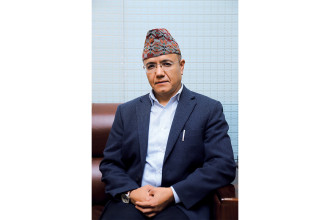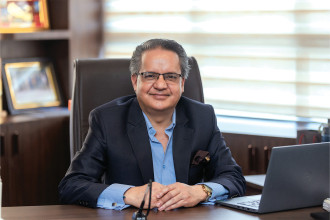
It was on completing school that Rajendra Malla, President of Nepal Chamber of Commerce, got involved in business. He shares that at the time much of the food sold in the markets of Kathmandu was brought from Sankhu where his family was based. “My father used to sell locally produced agricultural produce in Kathmandu. I thought it would be best if I opened a grocery store and that is how I got into business,” he shares.
Over the years, Malla has diversified his business portfolio and today sits on the board of a bank and an insurance firm besides the other businesses he owns. “I learnt early on about the need to diversify one’s investments,” he says, adding that if one business goes into loss, you could still make money from the other ventures. At present, Malla has investments in a wide array of companies ranging from the financial sector and hydropower to tourism. He lets on that he is soon getting into the real estate sector as well.
Malla joined the Nepal Chamber of Commerce about 16 years back and today heads the oldest private sector umbrella organisation of the country. In this edition of Business 360, we caught up with Malla to know more about his vision for NCC, his views on the national economy, and the finer aspects of what it entails to be a leader. Excerpts:
 Hence, we have been telling our district representatives to form agriculture committees and look into ways on how we can improve the production and productivity of a certain agro product that is grown locally. We also want to help farmers in marketing their produce. So, each district could focus on a certain crop and work accordingly. This will help us in both increasing production and improving the livelihoods of farmers.
The other area I will be focusing on during my tenure is information technology. We are in fact collaborating with Federation of Computer Association Nepal at the district level. Through this cooperation we want to develop pocket areas and set up IT parks. If we look at the global trend, it is blatantly visible that IT is the next big thing and we cannot miss the boat. Every year there are hundreds of IT graduates being produced but due to lack of career opportunities they are moving abroad. We need to tap into this massive potential.
Hence, we have been telling our district representatives to form agriculture committees and look into ways on how we can improve the production and productivity of a certain agro product that is grown locally. We also want to help farmers in marketing their produce. So, each district could focus on a certain crop and work accordingly. This will help us in both increasing production and improving the livelihoods of farmers.
The other area I will be focusing on during my tenure is information technology. We are in fact collaborating with Federation of Computer Association Nepal at the district level. Through this cooperation we want to develop pocket areas and set up IT parks. If we look at the global trend, it is blatantly visible that IT is the next big thing and we cannot miss the boat. Every year there are hundreds of IT graduates being produced but due to lack of career opportunities they are moving abroad. We need to tap into this massive potential.

As the leader of Nepal Chamber of Commerce what are your plans and goals during your tenure?
Ever since its establishment, NCC always envisioned to work as a bridge between the government and businesses. We look at ways in how we can facilitate business persons and we hold talks with concerned government officials regarding the general economic scenario of the country and provide feedback on how the economy can be improved. We also have signed agreements with nearly 45 international chambers to work on areas of mutual benefit. I will first be giving continuity to all these works. The other aspect which I am working on is to develop coordination between our central office and our offices at the local level. Previously, we were focused on only the central and international networks. But things have changed now as the country has adopted a federal system of governance, which means it is necessary to have our presence in all layers of the government. Through the NCC I also want to bring about some changes in the way we do our business. Right now the chamber is not only dealing with issues concerning exports and imports but also regarding the country’s production base. The problem in Nepal I feel is we rely too much on imports and the government too is mostly concerned about the revenue that can be generated from the customs offices. In fact, the customs offices are given certain revenue collection targets for the fiscal year. This mindset has to change now as the country will not be able to carry on this way in the longer term. We have started advocating for the need to enhance the production sector and be self-sufficient in as many sectors as possible. The Covid 19 pandemic has taught us a big lesson that we cannot always rely on imports, especially of food items. Hence, we have been telling our district representatives to form agriculture committees and look into ways on how we can improve the production and productivity of a certain agro product that is grown locally. We also want to help farmers in marketing their produce. So, each district could focus on a certain crop and work accordingly. This will help us in both increasing production and improving the livelihoods of farmers.
The other area I will be focusing on during my tenure is information technology. We are in fact collaborating with Federation of Computer Association Nepal at the district level. Through this cooperation we want to develop pocket areas and set up IT parks. If we look at the global trend, it is blatantly visible that IT is the next big thing and we cannot miss the boat. Every year there are hundreds of IT graduates being produced but due to lack of career opportunities they are moving abroad. We need to tap into this massive potential.
Hence, we have been telling our district representatives to form agriculture committees and look into ways on how we can improve the production and productivity of a certain agro product that is grown locally. We also want to help farmers in marketing their produce. So, each district could focus on a certain crop and work accordingly. This will help us in both increasing production and improving the livelihoods of farmers.
The other area I will be focusing on during my tenure is information technology. We are in fact collaborating with Federation of Computer Association Nepal at the district level. Through this cooperation we want to develop pocket areas and set up IT parks. If we look at the global trend, it is blatantly visible that IT is the next big thing and we cannot miss the boat. Every year there are hundreds of IT graduates being produced but due to lack of career opportunities they are moving abroad. We need to tap into this massive potential.
What’s your definition of a leader?
The foremost quality that a leader in any sector must possess is a clean image. The moment a person’s image is tarnished we cannot call them a leader. A leader also must not think that it is only them who can do all the work. Leadership is all about building a great team and surging ahead to achieve a set objective or goal. A leader should never say ‘I’; it should always be ‘We’. Another aspect I would like to mention is if you look at the various rules and polices that have been introduced by the governments here, then they are all very beautiful but the problem is that they are rarely implemented. So, as a leader you must be able to ‘walk the talk’. Do not raise the expectations of your members or followers if you cannot fulfil a pledge.Is leadership ‘in-born’ or ‘acquired’?
Leadership qualities can never be inherited. It is developed through all the experiences one goes through in life. And even after gathering the experiences it is only those who are capable that can become a leader. The external factor also plays a role in someone being designated a leader – do others want you to lead them? For instance, there are many capable members within NCC and some are senior to me but since the members decided to appoint me as their leader, I am at the helm of the organisation. Unless people have faith in you and want you to lead them how can you be a leader? At the end of the day a leader is an amalgamation of many factors.Who comes to your mind as ‘an ideal leader’?
I have been very inspired by BP Koirala, Ganesh Man Singh and Man Mohan Adhikari and others who led the various political parties during that era in Nepal. These leaders sacrificed literally everything for the sake of democracy in the country. They never had any vested interests and anything they said or did was always for the good of the nation. I feel we are missing such leaders at present. Another leader who I have always been inspired by is Abraham Lincoln. Reading about his childhood and the difficulties he had to face amazes me because despite those hardships he was able to become the president of the United States and played a defining role in abolishing slavery.
How important is it to have a good team to work with?
A team is of utmost importance for any person in any sector and there must always be mutual trust among its members. The team always has to be a core part of the decision-making process. Decisions cannot be taken on individual whims. What a leader can do is float the vision and options but ultimately decisions need to be based on consensus. Discussions must be held and feedback taken before any decision is finalised. Each individual has their strengths and weaknesses and a leader must be able to tap into their strengths and help them overcome their weaknesses. In fact, even after a target has been set a leader must hold regular meetings with the team to gauge the progress. Even in a family we hold discussions before coming to any conclusion on any issue. And a family is probably the smallest team in life. So, if we have to hold talks even within the family for any decision then just contemplate how important a team is in the wider sphere of life? At times they will be some who could go astray from the objective the team has set. However, reprimanding that person is not going to solve the problem. It is always necessary as a leader to take the concerned person into confidence and have a no-holds barred conversation so that both the parties can vent their concerns. But when you walk out of the room both have to be on the same wavelength.Could you share with us any incident that tested your leadership ability?
As a business person you tend to face challenges on a day-to-day basis, more so when you are leading an organisation like NCC which has thousands of members. From the business point of view every time we face a loss it is a challenge but again, we have to understand that at times we make profits and there are moments when you face losses. You should not let each incident have an impact on you. As a leader of any team, whether it is the classroom or the country, one’s leadership will always be tested – the only difference is the nature and intensity of it. There is one challenge though which is not related to only me personally but the overall scenario in the country and it is the credit culture in Nepal. As a business person whether you are importing finished products or raw materials it is quite a hectic process as you have to open a letter of credit and send the payment in advance. This is usually done by obtaining loans from banks after keeping your property as collateral. But when you sell the goods it is usually on credit and by the time you can recoup your money so much time has elapsed. So what happens is when the goods are priced the time taken to recoup the credit and the bank interest one has to pay are also factored in, which makes the product costlier for the end-consumer. It is time we get rid of the credit culture. It always tests one’s patience.When should a leader hand over their leadership position?
A leader has to always be aware of when to hand over the baton. There isn’t any fixed age for that actually. It’s just that one has to know when the time is appropriate and I feel the sooner it is the better. When you hand over the responsibilities what you are actually doing is also allowing that person to walk in with their individual vision and ideas for the organisation. So, when there is a change in the leadership position the organisation gets a new vision which could be better than the previous one. If you look at the political situation in Nepal, then that is the main reason why we have become stagnant. Nobody wants to hand over their roles and we have been stuck with the same set of people and no new vision for the nation.How can a leader prepare for the unknown?
There is a saying in Nepali that when you go to hunt a fox you should be armed enough to kill a tiger. It is always good to be over-prepared than under-prepared. So, before a leader sets out to accomplish any task they should not only have the target in mind but also know about the various problems that could occur during the course of the work. And this is possible only if you do proper research. Always remember to do things one step at a time.
Published Date: December 13, 2021, 12:00 am
Post Comment
E-Magazine
RELATED Leadership





-(1)-1752214965.jpg)